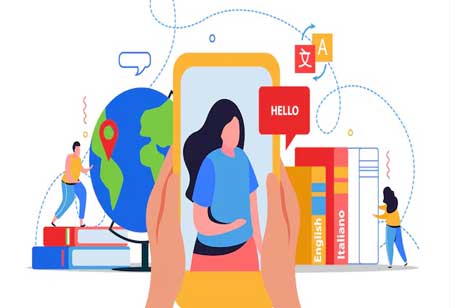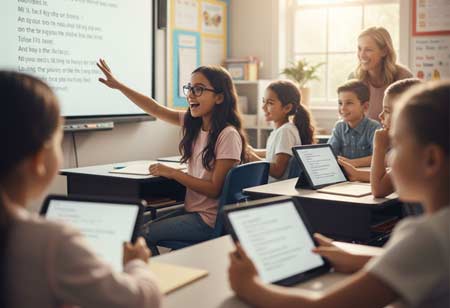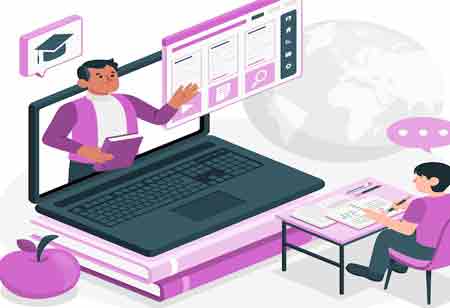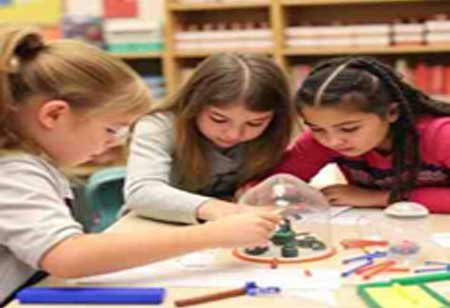THANK YOU FOR SUBSCRIBING
Be first to read the latest tech news, Industry Leader's Insights, and CIO interviews of medium and large enterprises exclusively from Education Technology Insights
Social Media and Its Role in Advancing Education Systems
Social media enhances education by providing resources and promoting communication and digital literacy, but schools must integrate it, monitor usage, and enforce cyberbullying policies.

By
Education Technology Insights | Monday, November 17, 2025
Stay ahead of the industry with exclusive feature stories on the top companies, expert insights and the latest news delivered straight to your inbox. Subscribe today.
FREMONT, CA: Social media plays a significant role in daily life, influencing various aspects of society, particularly education. Its transformative potential has created new opportunities for learning, collaboration, and communication. However, challenges remain in fully realizing its advantages.
Positive Impacts
Enhanced Access to Information: Social media platforms provide access to various educational resources, including online courses, tutorials, and research papers. Students can explore diverse perspectives and learn from experts around the world.
Facilitated Communication and Collaboration: Social media enables students to connect with peers, mentors, and teachers, fostering collaboration and knowledge sharing. Online forums and discussion groups facilitate discussions, idea exchange, and the formation of study groups.
Personalized Learning: Social media platforms offer personalized learning experiences by tailoring content to individual needs and interests. Students can follow relevant hashtags, join interest groups, and access curated content aligned with their learning goals.
Development of Digital Literacy Skills: Engaging with social media helps students develop essential digital literacy skills, including critical thinking, information evaluation, and responsible online behavior.
Innovative Teaching Methods: Educators leverage social media to create engaging and interactive learning experiences.
They can share resources, conduct virtual field trips, and use social media tools to enhance classroom discussions.
Schools should integrate digital literacy education into their curricula to maximize the benefits of social media in education, equipping students with the skills to use social media responsibly and critically evaluate online information. Additionally, parents play a crucial role by monitoring their children's social media use, establishing appropriate guidelines, and fostering open discussions about online safety and responsible behavior. Furthermore, teacher training is vital, as educators must be equipped with the skills to effectively integrate social media into their teaching practices while addressing potential challenges. Finally, social media platforms should enforce robust policies to combat cyberbullying, misinformation, and harmful content, promoting a safe and positive online environment for students.
AI and ML play a transformative role in education, mainly through personalized learning approaches. AI-powered algorithms analyze students' learning patterns and preferences, allowing for the customization of educational content to enhance relevance and engagement. Intelligent tutoring systems, driven by AI, offer personalized support by providing real-time answers to questions and explanations tailored to individual needs. Additionally, AI streamlines the grading process, enabling educators to allocate more time to meaningful interactions with their students.
The influence of these technologies is profound in the realm of higher education. Universities and colleges are increasingly adopting online learning platforms that facilitate course delivery and interactive discussions among students and faculty through social media. These platforms promote remote collaboration, allowing students and educators to engage in research projects, share ideas, and participate in virtual conferences and seminars. Furthermore, social media is vital for alumni networking, supporting job searches and career development opportunities in an interconnected professional landscape.
Social media has the potential to revolutionize education, but it is a tool that must be used wisely. Understanding its benefits and drawbacks and implementing responsible strategies can harness its power to create a more engaging, collaborative, and equitable learning experience for all students. The impact of social media on education is multifaceted and ever-evolving. By understanding its potential benefits and challenges, educators, policymakers, and students can work together to create a future where technology empowers learning and fosters innovation.







